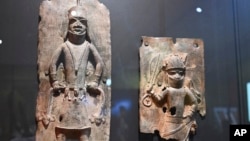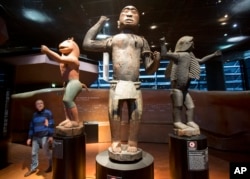African countries have reclaimed many historic objects, called artifacts, from European countries.
Recently, Nigeria and Germany signed a deal for the return of hundreds of artifacts known as the Benin Bronzes. The deal followed French President Emmanuel Macron's decision last year to sign over 26 pieces known as the Abomey Treasures. Those are valuable artworks from the 19th century Dahomey kingdom in present-day Benin.
But many artifacts are still missing and some countries have also been resistant to returning them.
One such object is an eight-legged seat from the old kingdom in Uganda. The important artifact now sits at a museum thousands of kilometers away in Britain.
The wooden seat is housed at the University of Oxford. It is one of at least 279 objects there taken from the Bunyoro-Kitara kingdom during colonial times. Oxford has fought off attempts to have the artifact taken back to Uganda, saying it was donated to the university.
Apollo John Rwamparo is a deputy prime minister of Uganda. He urged the British to do “like the French and the Germans have done and return the artifacts.”
Uganda officials are preparing to meet in November with the University of Cambridge in Britain. The school has an unknown number of artifacts from Africa. It recently returned a bronze cockerel to Nigeria.
But London's British Museum has been hard to negotiate with, said Rose Mwanja Nkaale. She is Uganda's commissioner for museums and monuments. “We can start with those that are willing to cooperate. It is not useful to fight these people."
The British Museum holds a large collection from across Africa. It is protected by a 1963 law preventing the museum from returning artifacts unless the objects are considered unfit or useless. Some African officials believe that law is increasingly weak as other nations have been more open to returning them.
Abba Isa Tijani is director-general of Nigeria’s National Commission for Museums and Monuments. He said Nigeria is pressuring Britain and other countries to change the laws permitting the return of disputed collections. But he expressed concern that while some countries are starting to open up, in Britain such efforts “have not even started.”
Many of the artifacts from Africa cannot even be found. That led to an organization started by late Congolese art collector Sindika Dokolo. It offers to buy stolen African art from collections in foreign countries. By 2020, when Dokolo died, his group had successfully recovered 15 items.
However, recovery of artifacts remains a struggle for African governments. And the African Union has put the return of stolen cultural property up for discussion. The union aims to soon have a common policy on the issue.
Zimbabwe has pushed for the return of about 3,000 artifacts from Britain. They include weapons as well as the skulls of fighters who fought against colonialism. Their heads were cut off and shipped away as war prizes.
Talks between British and Zimbabwean officials have produced no big agreement. But the issue is so important for Zimbabwe that President Emmerson Mnangagwa last year suggested an exchange. Zimbabwe would return the remains of colonialist Cecil Rhodes, who is buried in the country. In return, Zimbabwe would receive the remains of the fighters.
Rwanda recently made an agreement with its former colonial occupier, Belgium. The deal included the sharing of digital copies of over 4,000 songs and other recordings kept at the Royal Museum for Central Africa outside Brussels.
But the location of the remains of one of Rwanda's last kings, Yuhi Musinga, is a serious issue in the East African country. Many Rwandans believe the body of Musinga, who resisted the Belgians and died in Congo, was sent to Belgium.
Antoine Nyagahene is a professor of history at Rwanda’s Gitwe University. He said there should be some justice in that case.
“We were robbed of our cultural values and, as you know, a people without roots are a people without a soul,” he said.
I’m Dan Novak.
Dan Novak adapted this story for VOA Learning English based on reporting by The Associated Press.
_______________________________________________________________________
Words in This Story
kingdom— n. a country whose ruler is a king or queen
museum — n. a building in which interesting and valuable things are collected and shown to the public
cockerel — n. a young male chicken
monument — n. a building, statue, etc., that honors a person or event
colonialism — n. control by one country over another area and its people
root — n. the family history of a person or a group of people
________________________________________________________________________
We want to hear from you. We have a new comment system. Here is how it works:
- Write your comment in the box.
- Under the box, you can see four images for social media accounts. They are for Disqus, Facebook, Twitter and Google.
- Click on one image and a box appears. Enter the login for your social media account. Or you may create one on the Disqus system. It is a blue circle with “D” on it. It is free.
Each time you return to comment on the Learning English site, you can use your account and see your comments and replies to them. Our comment policy is here.











Forum